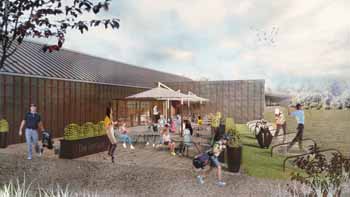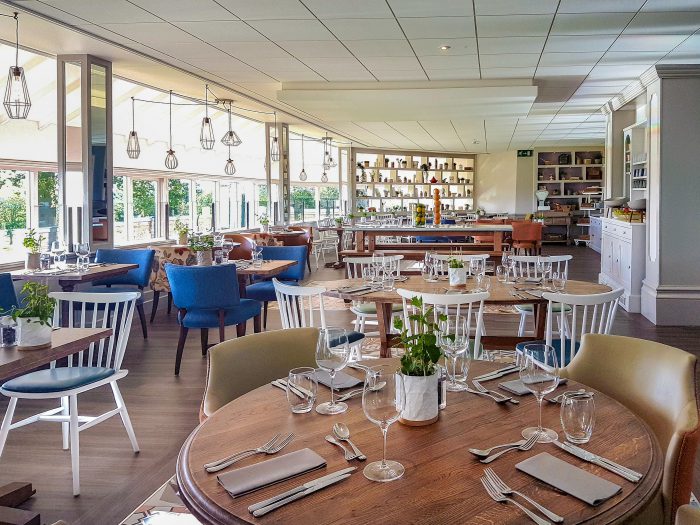Preparing for the return of F&B
Golf clubs, especially private members’ ones, should prepare for the return of their bars and restaurants by evaluating their staff costs in these departments, argues food and beverage consultant Steven Brown.
It is a strange phenomenon: The pandemic has seen all golf clubs close their clubhouse doors, thus dramatically, and in some instances cataclysmically, affecting food and beverage operations but, at the same time, there has seen such a surge in applications to join golf clubs that many clubs now have waiting lists for the first time in a decade.
The good news is that much-needed income has been generated so, whereas F&B income has greatly declined, or even totally disappeared in some cases, clubs have not necessarily been left high and dry financially.

Many clubs have successfully experimented with a takeout or take-home service, providing a limited menu either from the clubhouse or the halfway house. Other enterprising clubs have erected temporary marquees to deal with the influx and, whilst obviously an expensive option, these clubs have argued that the expense of providing this service is outweighed by the fact that they have managed to continue to provide a service to both new and existing golfers and to make the golf experience as normal as possible in these difficult times.
For my part I have been extremely busy answering questions from clubs about the future of F&B trading in their golf clubs and of what should be done to prepare for a return to normality.
I have always encouraged golf clubs to finetune and streamline their F&B operations, cutting out or at least reducing, inefficient and non-productive practices.

Over the past year the quieter trading times of F&B operations in clubs has afforded the opportunity to closely examine the finite workings of the organisations, and I thought it might be useful to highlight some of the areas that can, and almost certainly will, make a difference to your operations. Particularly staffing costs.
The furlough scheme has somewhat forced upon clubs the need to scrutinise the huge costs of employing staff.
All clubs have had, justifiably, to take the difficult decisions to either furlough staff or indeed to terminate their employment following statutory guidelines, but these furloughed staff can still contribute to your operation by helping you to review and reformat your units.
For your part you can try to answer this question: Why are so many clubs providing a staffing level that ensures that their F&B operations stand little chance, if ever, of providing a positive contribution to the club’s bottom line, if not actually ensuring that, because the club continues to pay non-commercial wages to the F&B unit, that extra pressure is put upon the club to generate more and more funds from other areas of trading to subsidise the F&B wage payments.
This situation would never be allowed to exist in high street commercial ventures or, I suspect, in proprietary owned golf clubs. Measures would be taken to reduce the wage payments to make each of the units accountable for their individual performance.

A number of my clients would argue that their F&B staffing levels exist to provide a service to their customer base, and that if the cost of supplying that service exceeds sensible commercial levels, then so be it as their members both demanded and deserve that level of service. I have no issue or argument with that at all, so long as the club can afford that level of subsidy. Not all clubs can.
My only argument is that, whilst I must accept the club’s decision to utilise this level of service with their full-time staff, why does the club have to use the army of hourly paid staff at slack times? A review of all staff’s productivity is of paramount importance.
I have to justify to my clients that the staffing levels they have are worth retaining because the employed staff make a positive contribution to the unit’s bottom line and are not a drain upon it. If I cannot prove that then I am duty bound as an independent advisor to recommend a course of action to remedy the issue which can be sometimes deemed to be drastic.

I have witnessed too many instances of over-manning of bar operations by hourly paid staff at slack times because full-time staff are ‘busy’ doing ‘other things’. This practice needs to be reviewed, challenged and certainly discouraged, leading inevitably to large savings on the wage bill.
In addition, too many clubs are hiring a chef when a competent cook could easily have covered off the menu.
If your club offers a typical golf club fare ranging from the usual bacon bap to a ‘special of the day’, then that can be serviced by a competent cook rather than a chef with a saving, regarding wage payments, running in to thousands of pounds.
In the past year I have visited clubs with bar wage bills that have ranged from 34 to 114 percent! Catering wages have ranged from 41 to 128 percent! Surely, and with a review of working practices, those payments at the higher end, can be reduced without affecting the level of service provided to the clients.
If clubs are prepared to accept wage payments at this level then so be it, but surely any reductions in these wage costs takes pressure off of other areas of the business. Failure to arrest the costs could mean that you will have to face the unenviable task of having, at some future stage, to go to the membership and ask for an increase in their annual fees to help subsidise the F&B unit, a number of whom do not even support it with their custom!

The wages topic, together with the eternally asked question of which trading model is right for us moving forward (in-house versus franchised) are the ones that exercised me most during my latest round of club visits.
I have had to recommend to some clubs that, if they are to survive the downturn in trade, then they need drastically to review the head count in their business, which I know many of you have either already done or are considering at this time.
Nobody wants to willingly undertake this exercise, but your duty to the club must surely be to safeguard and protect its best interests in all matters. If you can redefine the job roles for displaced staff (as I recently recommended to a client) then this can help ease the difficulty.
Now, the upside to all of this is how you are planning for the future of your food and beverage operation in a post Covid-19 world.

If you can justifiably persuade the club that your three-year F&B business plan illustrates a realistic growth pattern that will need the current staffing levels to deliver it, then you may wish to retain (and retrain) staff for that purpose but of course there is a risk and reward factor here.
Your future trade must maximise the resources you have and fully utilise the staff’s time and levels of expertise.
Once we have weathered the storm and can hopefully return to some more normal degree of trading levels, you need to be ready to relaunch a new and revitalised F&B service that includes newly designed and smaller menus, permanent table service (higher wage costs!) and reduced opening hours (thus cutting at the need for unprofitable trading times.)
I believe this awful pandemic has offered you the opportunity in the downtime to refocus on how you can improve your F&B offerings and that, in doing so, will make it easier for you to provide some stand-a-lone profit centres for your club with plans that encompass tried and tested trading models and practices leading to less stress and pressure on the club’s other resources.

Pouring a Draft Blonde Beer in a Pint Directly from the Tap
We need staff! We need staff to be energised, productive and focused on how they can provide the club with the same level of return of investment the club has made in them.
I want clubs to take this current opportunity to make plans regarding their F&B future trading opportunities, and to recognise how the right levels of staff will help to achieve these aims.
These are unprecedented times, full of ifs, buts and uncertainties, but I am totally confident that food and beverages operations in golf clubs will emerge from this time fitter, leaner and much better prepared to face the challenges ahead, if you act now.
Steven can be contacted on
Mobile – 07785 276320
Email – herinn@aol.com















Let me tell You a sad story ! There are no comments yet, but You can be first one to comment this article.
Write a comment